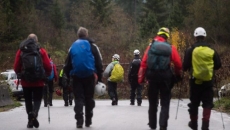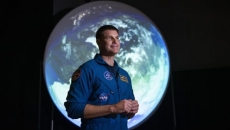Far from the jungle, Tarzan and Jane swing quietly into action in a sterile laboratory at St. Paul's Hospital in downtown Vancouver.
They are robots that work with artificial intelligence to handle and process up to 70 per cent of the hospital's microbiology samples.
The pair unscrew specimen tubes and streak the samples onto bacterial culture plates in the new $1-million automated WASPLab, short for "walk-away specimen processor."
It's not glamorous work, but it's a big job — the St. Paul's lab handles more than 145,000 microbiological samples each year from B.C. and Yukon.
Lab automation is not new, but the hospital says WASPLab's use of AI is a first for Western Canada, assessing and sorting culture plates, separating bacterial cultures and letting staff know if something needs more analysis.
Dr. Marc Romney, head of medical microbiology and virology at St. Paul's, said the new level of automation made doctors' and lab technologists' lives easier by freeing them from repetitive manual work.
Tarzan and Jane have been working at the lab for two months. Romney said they are "great workers," willing to work early morning and late shifts and able to deal with a large batch of samples all at once.
“We appreciate the fact that they are allowing the lab staff to perform more complex work .… So, the more routine work which is sometimes very manual is being replaced by a robot,” said Romney.
"It gives us a lot more flexibility in our workflow," he added.
When the robot duo first arrived, there was a lot of excitement, said Romney, as well as a little bit of apprehension from lab staff.
"Because people think, (is) this machine going to take over my job? But ultimately, they realize no, it's going to make my life easier," said Romney.
Tarzan and Jane each have their special skills.
Tarzan is good at the "heavy lifting" of preparing specimens for the next stage of bacterial culture, said Romney.
The robot picks up the specimen — it could be either a urine culture or wound swab — and scans the bar code to determine what needs to be done with it.
Then Jane does the finer work of applying a precise volume of the specimen onto the surface of the bacterial culture plates.
The plates are placed on a conveyor belt, labelled, then stored in an incubator, allowing the bacterial colonies to grow.
Romney said it's after incubation that the WASPLab's artificial intelligence comes into play, discarding negative culture plates while reporting the positive ones.
"This used to be all manual, and now it's automated by these two robots, Tarzan and Jane. It would have taken much longer for humans to do it," said Romney.
The robots were created and named by Italy-based lab automation manufacturer Copan.
The hospital said in a statement that doctors and laboratory staff spent months collaborating with Copan to customize the WASPLab to ensure it met the hospital's needs. It was funded by a donor to the St. Paul’s Foundation.
The system is not infallible. Romney said the robots occasionally make errors, and Tarzan has been known to drop tubes.
"In real life, we know that complicated technology sometimes goes wrong, and we need to supervise it … and even Tarzan and Jane sometimes make mistakes, and so we have to have humans there to correct those mistakes when they occur," said Romney.
Another WASPLab will be set up when the new St. Paul’s Hospital opens its doors in 2027, said Romney.
Could robots and AI completely replace human staff in hospitals of the future?
Romney said both would play a role in health-care settings but would never completely replace medical professionals.
"If I were a patient, I'm not sure I would have total confidence in robots to provide my entire care," he said, admitting he "might be biased."
The vast majority of the time, automated systems "work really well." Romney said.
"But sometimes, it does make some errors … AI is a big part of the future in health care, a big part of the future for hospital acute care. But it's not the be-all and end-all."
He predicted that AI would instead free the next generation of physicians from "simpler work."
"But what's happening in health care is that the level of acuity and complexity in our patients is going up significantly … and I think it makes it harder for AI to make a definitive answer," said Romney.
"It's not impossible. But it requires, I think, some human intervention."






